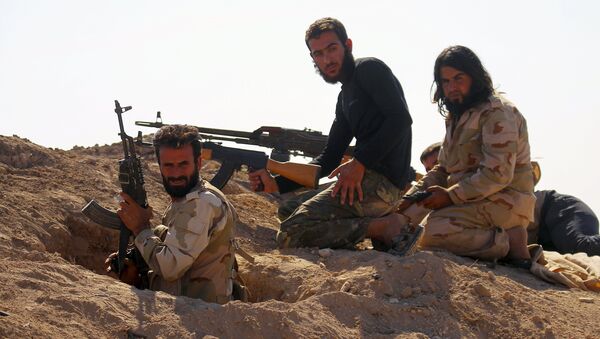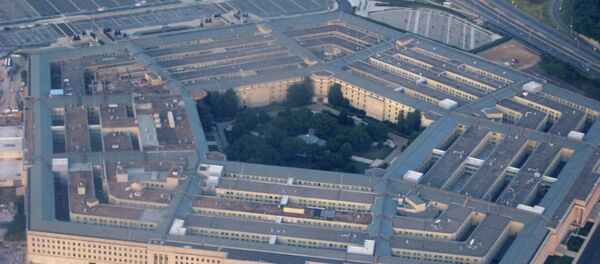In his article published in Foreign Affairs in September 2014 Kenneth M. Pollack, a former CIA intelligence analyst, proposed to form, arm and train an opposition army (about 3,000-6,000) in order to fight ISIL and Assad. Interestingly enough, in January 2015 the Pentagon announced that it kicked off a plan strikingly similar to that offered by Pollack in September 2014. According to NYT, the Pentagon is currently preparing a large-scale operation involving some 3,000 Arab warriors and 20,000 Kurdish combatants (as well as US-led coalition's warplanes) in order to take Raqqa. Do you regard this operation as a "response" to Russia's (and Assad's) military success in Syria? Is it possible that the US and its proxies will try to form an "alternative" Syrian state with a new provisional government in Raqqa (if they take it) and divide the country into North Syria (held by US-backed proxies) and South Syria (held by pro-Assad forces).
Eric Draitser: The US strategy in Syria has undoubtedly been complicated by Russia's anti-terror operation in Syria, but I think one should be careful in assuming that US actions are solely a response to Russian involvement. Perhaps a more precise analysis would note that Washington has pursued the ultimate goal of regime change in Syria consistently since 2011, as has been demonstrated by all the actions and rhetoric from the Obama administration since that time. Today, the US is still pursuing that same goal, though through different means — the US is partnering with various terror groups on the ground, and with its regional allies (especially Turkey) to try to "create facts on the ground" so as to force the Syrian government into a weaker position.
It should be noted that the idea that a small force of a few thousand Arabs and and significant number of Kurds taking control of Raqqa from the Islamic State is patently absurd. First and foremost, Kurds have demonstrated a ferocity and dedication in the fight when defending and/or retaking Kurdish land occupied by the Islamic State. They have shown little to no interest in expending material, treasure, and lives fighting terrorists for control of non-Kurdish land. This is simply a fact of the battlefield that any real expert on the situation knows is simply inescapable. Therefore, such a force would prove entirely incapable of taking Raqqa. However, where that force would be useful is in providing cover for a more covert US military/intelligence operation on the ground in Syria. It is likely that this would be the real motive for constructing such a force as was discussed in the NY Times. And with Russian jets in the air and the Syrian Army on the move, such an escalation by the US would undoubtedly raise the stakes for all players in Syria, especially considering the US's long, documented relationship with terrorists in Syria, and Washington's penchant for providing them with advanced weaponry.
Is there a possibility that the widely discussed offensive on Raqqa is just a pretext to arm the US-trained terrorists in the region to fight Assad? (The US-led anti-IS coalition dropped 50 tons of weapons in Hasakah province in the beginning of the week.)
Eric Draitser: The Raqqa offensive is the facade behind which the US will hide its covert activities in support of terrorist groups falsely labeled as "moderate rebels." The US knows perfectly that it cannot openly arm terrorists, so it must do so under cover of a counter-terrorism operation such as this. We've seen this program of arming terrorists begin in earnest, as with the reports of the 50 tons of ammunition and weapons airdropped by the US into the Hasakah region, ostensibly destined for 'moderate rebels' though everyone acknowledges the impossibility of knowing exactly who got the weapons and ammunition. It is interesting to note that even western media, as well as Arab anti-Assad outlets, have reported that so-called 'moderates' armed and trained by the US consistently either surrender to Nusra and ISIS/ISIL, or simply go over to their side and bring their weapons with them. It is now documented fact that this happens in the many, if not most, cases. Knowing this, as the US unquestionably does, one could make a very good case that the US is knowingly indirectly (if not directly) arming the Islamic State and al-Qaeda.
It's clear that there is some friction between the US and Turkey over the Syria war, and that it will have far-reaching repercussions for the US-backed project in Syria. The fact that US air power and military might is being deployed in backing the Kurdish forces is undoubtedly a major source of irritation for the Turkish government, especially as it is a NATO member and arguably the most vocal, most active participant in the international war against Syria. However, one should not make the mistake of believing that Turkish annoyance will translate into a significant political or geopolitical change. Erdogan's ideological framework is such that he sees himself as a regional hegemon whose influence and power will stretch from the Mediterranean to Western China. This is what drives him to continue to fight for a puppet government to be installed in Syria, and for free rein to massacre the Kurds as he pleases.
The US' longstanding ally Turkey has already signaled that it is outraged by Russia's operation in Syria, but Saudi Arabia remains suspiciously silent. Back in 2014 Thierry Meyssan noted in his article that although the US is closely monitoring the oil market al-Nusra and ISIL are still able to sell oil globally: "If the Front al-Nusra and the ISIL are able to sell oil on the international market, they are authorized by Washington and are linked to storefront oil companies."
The US shale industry is still alive despite oil prices remains low, and some experts go even so far as to claim it is because the US oil tycoons are relying on oil received from terrorists. Saudi Arabia is seemingly dissatisfied with the current state of affairs and suffering from the slump. Is that possible that the Kremlin and Riyadh have concluded a deal in order to smash the terrorists and stop the mess around oil prices?
Eric Draitser: The notion that Russia and Saudi Arabia have concluded a secret deal is obviously intriguing, though perhaps unlikely. Not impossible, but unlikely. Saudi Arabia is very much a client state of the US, and with its recent instability, it is all the more reliant on its superpower patron in the West. Any rumors, founded or unfounded though they may be, of a Saudi-Russian deal would probably spell doom for the House of Saud, the regime that so brutally rules its reactionary feudal kingdom.
Finally, the Saudis are reeling from the precipitous collapse of global oil prices, a trend which has hurt both Russia and Saudi Arabia. However, being so closely linked with, and dependent on, the US, Saudi Arabia can do very little other than allow itself to be used as an economic weapon in the ongoing attempt to undermine and weaken Russia's economy. While it would be natural for Saudi Arabia to significantly decrease production in order to stimulate global oil prices, it has been unwilling to do so for fear of earning the ire of Washington. So, Riyadh is stuck between the proverbial rock and a hard place as it is forced to pursue a policy detrimental to its own interests.
For all of these reasons, the Saudi regime is increasingly unstable, having led many mainstream pundits to speculate that the end of the monarchy could come sooner, rather than later. This is probably a fanciful notion, however it does point to a growing international consensus that something is rotten in Riyadh. As such, now would be the time to solidify the alliance that sustains the regime (US) rather than pursuing multi-vector strategies (US and Russia). The Russians and Saudis have had discussions about terrorism and, quite likely, the Saudi-financed terror networks active both in the Middle East and in Russia's Caucasus region. But the idea of a comprehensive deal between the two is unlikely.
Is there any threat of direct confrontation between the US and Russia in Syria?
Eric Draitser: With both militaries operating in the same theater, there is of course always the potential danger for conflict. However, it is unlikely given the current conditions and the preliminary steps taken by both sides to avoid any incidents or misunderstandings. The US and Russia have already concluded a deal to cooperate in preventing incidents and providing for mutual aid in critical situations such as downed pilots. While the deal is limited to cooperation to avoid conflict, rather than actual partnership in the anti-terrorism operation, it is a positive sign that, at least among the military leaderships, there is a recognition of the danger in not cooperating with each other.
Ultimately, the chances of direct confrontation are low, as there are still realists in Washington, especially in the military brass, who understand the inherent dangers of provoking Russia too much. However, one should never discount the possibility of a Dr. Strangelove type mentality from taking hold on the US side. Of course, in this case, it would not be at all funny.





